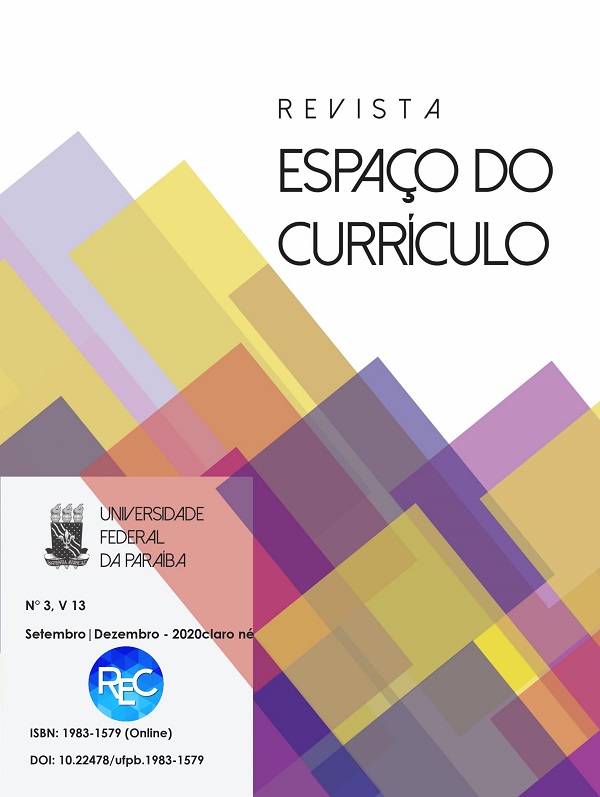THE "WITHOUT FEELINGS"
subjects in marginalization and language
DOI:
https://doi.org/10.22478/ufpb.1983-1579.2020v13n3.52994Keywords:
Socio-educational, Necropolitics, Youth, Subjectivity, PsychoanalysisAbstract
Identifying as one of the effects of marginalization on subjectivity, the theft of the intimate word, the choking of singular speech that escapes the narrow repertoire of discourses that already precede them, we have been developing workshops in different contexts with people who, or have passed through the penal, socio-educational system, or are effectively in them. Because we realize that, in some way, there is a serious difficulty in talking about feelings, that is, in talking about what makes us up but that does not have a clear outline, which is not evident even for ourselves and precisely because this is what we are, we made this perception the reason for a series of psychoanalytically inspired activities with young interns at the CRIAAD and CAI units - Baixada do Degase / RJ. In this article, then, the expression, common to be advertised as a “positive” characteristic of the criminal, “without feeling”, found written in pencil, even on one of the tables in the room where we work with them, triggers a seam among some reports from our workshops and a theoretical repertoire of studies of subjectivity, notably, drawing consequences from the concept of necropolitics in Mbembe, in the sense of investigating how the subjectivities marked by the identification as “killable” are falsely divorced from their feelings, settling in a supposed coldness monstrous that, in life, facilitates living with his death while imminent.
Downloads
Metrics
References
BRASIL. Constituição da República Federativa do Brasil: Promulgada em 05 de outubro de 1988. http://www2.planalto.gov.br. Acesso em 20 de janeiro de 2018.
BRASIL. Decreto-lei nº 3688, de 03 de outubro de 1941. Dispõe sobre a Lei das Contravenções Penais. Disponível em: <http://www2.planalto.gov.br>. Acesso em: 21 de janeiro de 2018.
BRASIL. Lei nº 11.343, de 23 de agosto de 2006. Institui o Sistema Nacional de Políticas Públicas sobre Drogas - Sisnad; prescreve medidas para prevenção do uso indevido, atenção e reinserção social de usuários e dependentes de drogas; estabelece normas para repressão à produção não autorizada e ao tráfico ilícito de drogas; define crimes e dá outras providências. Disponível em: <http://www.planalto.gov.br>. Acesso em: 20 de janeiro de 2018.
BRASIL. Decreto-lei nº 2848, de 07 de dezembro de 1940. Dispõe sobre o Código Penal Brasileiro. Disponível em: <http://www2.planalto.gov.br/>. Acesso em: 20 de janeiro de 2018. . Lei federal nº 8069, de 13 de julho de 1990. Dispõe sobre o Estatuto da criança e do adolescente. Disponível em: : <http://www2.planalto.gov.br/>. Acesso em: 20 de janeiro de 2018.
CONANDA/SEDH. Diretrizes Nacionais para a Política de Atenção Integral à Infância e à Adolescência. Brasília, 2002
CONANDA/SEDH. Sistema Nacional De Atendimento Socioeducativo – SINASE. Secretaria Especial dos Direitos Humanos, Brasília: CONANDA, 2006.
FOUCAULT, M. Vigiar e Punir. Petrópolis: Vozes, 2007.
FOUCAULT, M. Microfísica do poder. 24 ed. São Paulo: Edições Graal. 2007
FOUCAULT, M. O sujeito e o poder. In: DREYFUS, H. e RABINOW, P. (Orgs) Michel Foucault: Uma Trajetória Filosófica. Rio de Janeiro. Forense Universitária, 1995.
LACAN, J. A agressividade em psicanálise. In Escritos . Rio de Janeiro: Jorge Zahar, 1998, pp. 104-126.
MENESES, Elcio Resmini. Medidas Sócioeducativas: Uma reflexão jurídico pedagógica. Porto Alegre, 126 p. 2008.
ZIMERMAN, David E. Fundamentos psicanalíticos: teoria, técnica e clínica – uma abordagem didática. Porto Alegre: Artmed, 1999.
MBEMBE, Achille. Crítica da razão negra. Lisboa: Antígona, 2014.
MILLER, Jacques-Alain. Uma fantasia. Revista Brasileira Internacional de Psicanálise. Opção Lacaniana, nº 42, 2005. Disponível em: <http://www.congresoamp.com/pt/template.php?file=Textos/Conferencia-de-Jacques-Alain-Miller-en-Comandatuba.html>. Acesso em: 10 out. 2016.
MILLER, Jacques-Alain. Clínica e cultura. In: MILLER, Jacques-Alain. Lacan elucidado: palestras no Brasil. Rio de Janeiro: Jorge Zahar, 1997. p. 287-385.
POLI, M. C. Clínica da Exclusão. A construção do fantasma e o sujeito adolescente. São Paulo: Casa do Psicólogo, 2005.
Downloads
Published
How to Cite
Issue
Section
License
By submitting an article to Curriculum Space Journal (CSJ) and having it approved, the authors agree to assign, without remuneration, the following rights to Curriculum Space Journal: first publication rights and permission for CSJ to redistribute this article. article and its metadata to the indexing and reference services that its editors deem appropriate.
















